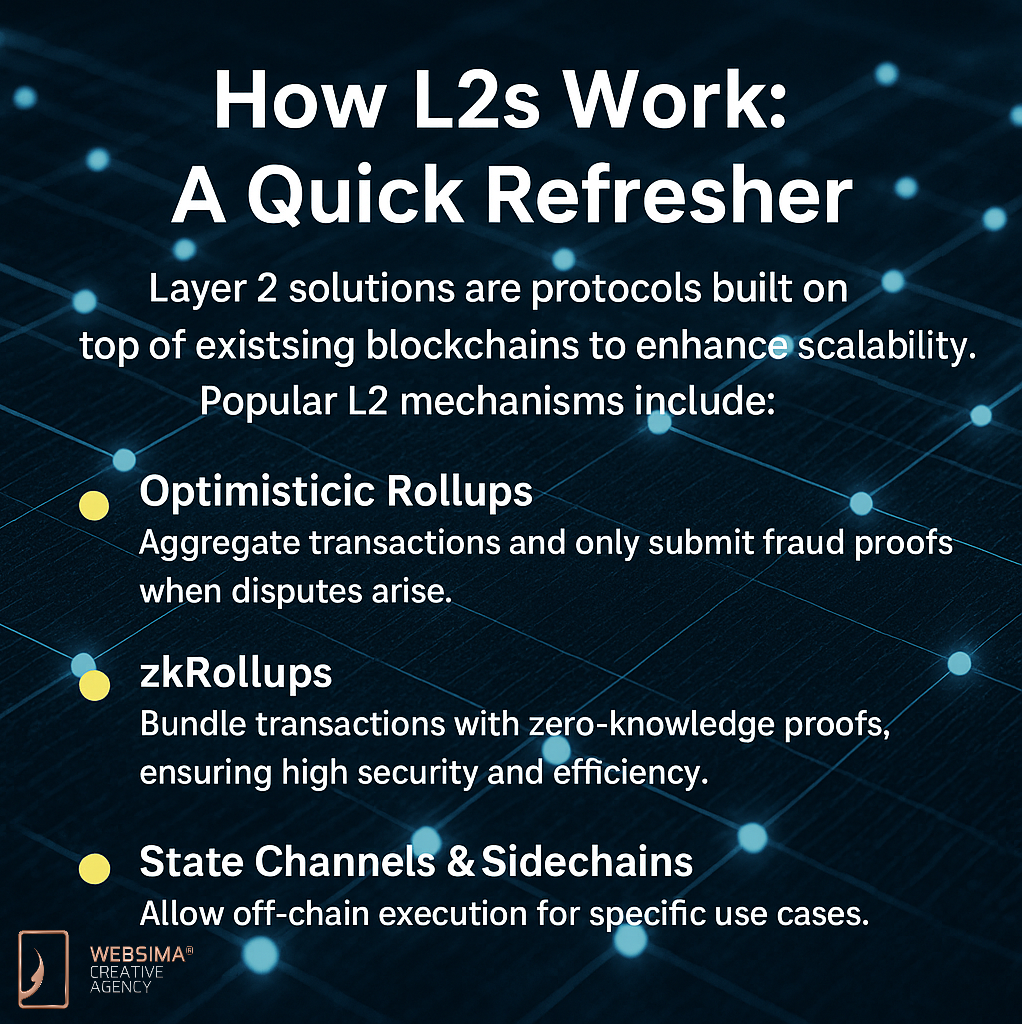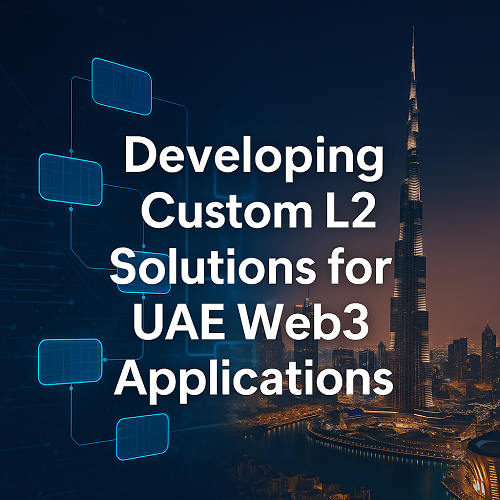Introduction
The UAE has positioned itself at the heart of blockchain innovation, with Dubai and Abu Dhabi both hosting thriving Web3 ecosystems. While the adoption of Layer 1 chains such as Ethereum remains strong, the demand for faster, cheaper, and more specialized platforms is leading startups to experiment with Custom L2 Solutions UAE workload and projects.
Layer 2 (L2) scaling solutions allow developers to build applications on top of Ethereum or other base chains while reducing costs and improving transaction speed. For UAE-based startups, the ability to customize these L2s provides a competitive edge across industries ranging from DeFi and NFTs to real estate tokenization and digital identity management.
Founders’ Trek 2023 delivered results: web3 legal strategy, founder residency and venture funding. Watch the recap video to see what you missed. pic.twitter.com/rHjFv5tntQ
— Superteam UAE (@SuperteamAE) January 8, 2024
This article explores why startups in the UAE are building custom Layer 2 chains, what benefits they unlock, and how businesses can avoid common pitfalls when developing them.
Table of Contents
- Why UAE Startups Are Turning to Custom L2s
- How L2s Work: A Quick Refresher
- Benefits of Custom L2 Solutions UAE
- Scalability and performance
- Reduced transaction fees
- Custom governance models
- Tailored compliance and KYC
- Use Cases of L2s in the UAE
- Real estate tokenization
- Decentralized finance (DeFi)
- Web3 gaming and NFTs
- Government and enterprise adoption
- Case Study: A Dubai Startup Using a Custom zkRollup
- Statistics on Global and UAE L2 Adoption
- Risks and Challenges of Custom L2 Development
- Mistakes to Avoid When Building L2 Solutions
- 2025 Outlook: The Future of L2 in the UAE
- FAQs
- Final Thoughts
- Websima: Building Secure and Scalable Custom L2 Chains
Why UAE Startups Are Turning to Custom L2s
Dubai’s Virtual Assets Regulatory Authority (VARA) has created an environment where blockchain entrepreneurs can experiment with advanced architectures. Custom L2s allow developers to build tailored ecosystems that integrate seamlessly with UAE-specific compliance requirements, such as AML/KYC mandates.
Startups see this as an opportunity to reduce costs while gaining control over governance and transaction logic, which is vital in highly regulated industries like finance and real estate.
How L2s Work: A Quick Refresher
Layer 2 solutions are protocols built on top of existing blockchains to enhance scalability. Popular L2 mechanisms include:

- Optimistic Rollups: Aggregate transactions and only submit fraud proofs when disputes arise.
- zkRollups: Bundle transactions with zero-knowledge proofs, ensuring high security and efficiency.
- State Channels & Sidechains: Allow off-chain execution for specific use cases.
By offloading traffic from Layer 1, L2s can process thousands of transactions per second (TPS) at lower costs (Ethereum Foundation).
Benefits of Custom L2 Solutions UAE
Scalability and Performance
Custom L2s deliver higher throughput than general-purpose rollups, enabling applications like NFT ticketing or metaverse platforms to scale for thousands of users.
Reduced Transaction Fees
While Ethereum fees often exceed USD 5–20 during congestion, L2s can cut costs to a few cents per transaction, making microtransactions viable.
Custom Governance Models
Startups can integrate bespoke governance structures such as DAOs optimized for UAE corporate structures.
Tailored Compliance and KYC
Custom L2s can integrate mandatory KYC checks at the protocol level, easing regulatory compliance in Dubai and Abu Dhabi.
Use Cases of L2s in the UAE

Real Estate Tokenization
Property transactions on Ethereum can be costly and slow. L2s allow fractional ownership platforms to settle property tokens quickly and cheaply.
Decentralized Finance (DeFi)
UAE-based DeFi platforms and Web3-based crowdfunding platforms in Dubai can use L2s for low-latency trading and stablecoin settlements with local currency integrations.
Web3 Gaming and NFTs
The UAE’s metaverse and gaming sectors benefit from low-fee NFT minting, making digital collectibles accessible.
Government and Enterprise Adoption
Enterprises in free zones like ADGM and DIFC are exploring L2s for document notarization, identity, and supply chain monitoring.
Case Study: A Dubai Startup Using a Custom zkRollup
A Dubai-based fintech startup recently piloted a zkRollup-based L2 designed for real estate tokenization.
- Transaction costs dropped by 92% compared to Ethereum mainnet.
- Finality improved to under 2 seconds per transaction.
- The L2 integrated built-in KYC modules aligned with VARA guidelines.
This allowed the startup to onboard institutional investors while maintaining compliance with UAE law.
Statistics on Global and UAE L2 Adoption
- As of early 2025, Ethereum L2s processed over 60% of Ethereum’s daily transactions, with leaders like Arbitrum and Optimism growing rapidly (L2BEAT).
- Polygon launched zkEVM, offering Ethereum-equivalent security with faster throughput, and is widely adopted by enterprises (Polygon zkEVM).
These figures highlight the global momentum that UAE startups are now leveraging.
Risks and Challenges of Custom L2 Development
- Security Risks: Poorly designed rollups may expose vulnerabilities.
- Liquidity Fragmentation: Splitting liquidity across multiple L2s can harm DeFi protocols.
- High Development Costs: Custom rollups require specialized cryptographic expertise.
- Regulatory Uncertainty: While VARA is supportive, cross-border compliance remains complex.
Mistakes to Avoid When Building L2 Solutions
- Over-customizing: Excessive changes can break interoperability.
- Ignoring audits: Skipping audits of zk circuits or fraud proofs risks user funds.
- Neglecting UX: Complex onboarding discourages mainstream adoption.
- Failing to align with UAE compliance: Ignoring AML/KYC requirements leads to licensing issues.
2025 Outlook: The Future of L2 in the UAE
The UAE is on track to become one of the most active hubs for custom L2 innovation. By 2025–2027, we can expect:
- Cross-L2 interoperability frameworks to reduce liquidity silos.
- Integration of central bank digital currencies (CBDCs) with L2 wallets.
- Enterprise-grade zkRollups tailored for industries like healthcare and logistics.
For Web3 startups, this is the moment to experiment with Custom L2 Solutions UAE before the market becomes saturated.
FAQs
- Why not just use Ethereum Layer 1?
Ethereum L1 is secure but expensive; L2s drastically reduce costs. - Can UAE startups legally launch custom L2s?
Yes, as long as they comply with VARA’s licensing framework. - What’s the difference between Optimistic and zkRollups?
Optimistic Rollups rely on fraud proofs, while zkRollups use cryptographic proofs for faster finality. - Are L2s only for DeFi?
No, they’re increasingly used in real estate, gaming, NFTs, and enterprise apps. - Do L2s compromise security?
Not if designed properly—zkRollups in particular inherit Ethereum’s security guarantees.
Final Thoughts
The rise of Custom L2 Solutions UAE reflects the country’s ambition to stay at the cutting edge of blockchain adoption. By combining scalability, compliance, and innovation, startups can deliver world-class applications that appeal to both local and global users.
The journey is not without risks, but for entrepreneurs ready to embrace Web3’s future, custom L2s provide the performance edge Dubai’s ecosystem demands.
Websima: Building Secure and Scalable Custom L2 Chains
At Websima, we specialize in designing and developing custom blockchain solutions, including Layer 2 rollups and zkEVMs tailored for UAE businesses.
From smart contract engineering to enterprise-grade security audits, we help startups and corporations unlock the benefits of L2 without compromising on compliance or scalability.
Ready to build your own Custom L2 Solutions UAE? Contact Websima.





